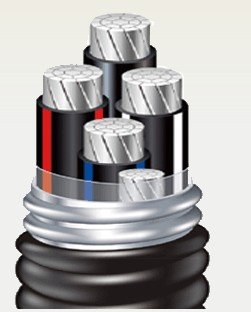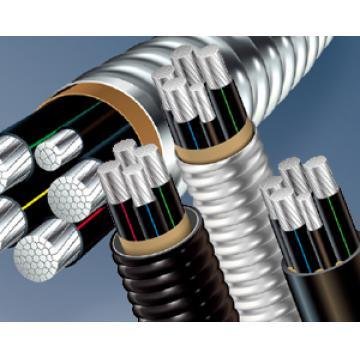Aluminum alloy power conductor is a new type of material power cable that uses AA8030 series aluminum alloy material as the conductor and adopts special roll forming wire stranding production technology and annealing treatment. Alloy power cables make up for the shortcomings of pure aluminum cables in the past. Although the electrical conductivity of the cable is not improved, the bending performance, creep resistance and corrosion resistance are greatly improved, which can ensure that the cable remains continuous during long-term overload and overheating. The performance is stable. The use of AA-8030 series aluminum alloy conductors can greatly improve the conductivity and high temperature resistance of the aluminum alloy cable, while solving the problems of pure aluminum conductors and creep. The electrical conductivity of aluminum alloy is 61.8% of the most commonly used benchmark material copper IACS, and the current carrying capacity is 79% of copper, which is better than the pure aluminum standard. But under the same volume, the actual weight of aluminum alloy is about one-third of copper. Therefore, the weight of the aluminum alloy cable is about half of the copper cable at the same current carrying capacity. The use of aluminum alloy cables instead of copper cables can reduce the weight of the cable, reduce the installation cost, reduce the wear of the equipment and the cable, and make the installation work easier.

The inherent anti-corrosion performance of aluminum comes from the formation of a thin and strong oxide layer when the AAAC Conductor surface is in contact with air. This oxide layer is particularly resistant to various forms of corrosion. The rare earth elements added to the alloy can further improve the corrosion resistance of the aluminum alloy, especially the electrochemical corrosion. Aluminum’s ability to withstand harsh environments makes it widely used as conductors for cables in trays, as well as many industrial components and containers. Corrosion is usually related to the connection of different metals in a humid environment. Corresponding protective measures can be used to prevent corrosion, such as the use of lubricants, antioxidants and protective coatings. Alkaline soil and certain types of acidic soil environments are more corrosive to aluminum, so directly buried aluminum conductors should use insulating layers or molded sheaths to prevent corrosion. In sulfur-containing environments, such as railway tunnels and other similar places, the corrosion resistance of aluminum alloy is much better than that of copper.
flexibility
Aluminum alloy has very good bending properties, and its unique alloy formula and processing technology greatly improve flexibility. Aluminum alloy is 30% more flexible than copper and has a 40% lower resilience than copper. Generally, the bending radius of copper cables is 10-20 times the outer diameter, while the bending radius of aluminum alloy cables is only 7 times the outer diameter, making it easier to connect terminals.
Armor characteristics
Commonly used armored cables are mostly armored with steel tape, with low security level. When subjected to external destructive forces, their resistance is poor, which is easy to cause breakdown, and the weight is heavy, the installation cost is quite high, and the corrosion resistance is poor. The life is not long. The metal interlocking armored cable we developed according to American standards uses aluminum alloy tape interlocking armor. The interlocking structure between layers ensures that the cable can withstand the powerful destructive force from the outside, even if the cable is subjected to greater pressure The cable is not easy to be punctured under the impact force, which improves the safety performance. At the same time, the armored structure isolates the cable from the outside world. Even in the event of a fire, the armored layer improves the flame-retardant and fire-resistant level of the cable and reduces the risk of fire. Compared with the steel tape armored structure, the aluminum alloy tape armored structure is lighter in weight, convenient to lay, and can be installed without bridges, which can reduce installation costs by 20% to 40%. According to the different places of use, different outer sheath layers can be selected, which makes the use of armored cables more extensive.
